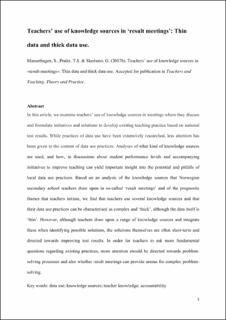Teachers’ use of knowledge sources in ‘result meetings’: Thin data and thick data use.
Peer reviewed, Journal article
Accepted version
Permanent lenke
https://hdl.handle.net/11250/2642012Utgivelsesdato
2017Metadata
Vis full innførselSamlinger
- Institutt for pedagogikk [285]
- Publikasjoner fra CRIStin [3623]
Originalversjon
Teachers and Teaching: theory and practice. 2017, 24 (1), 37-49. 10.1080/13540602.2017.1379986Sammendrag
In this article, we examine teachers’ use of knowledge sources in meetings where they discuss and formulate initiatives and solutions to develop existing teaching practice based on national test results. While practices of data use have been extensively researched, less attention has been given to the content of data use practices. Analyses of what kind of knowledge sources are used, and how, in discussions about student performance levels and accompanying initiatives to improve teaching can yield important insight into the potential and pitfalls of local data use practices. Based on an analysis of the knowledge sources that Norwegian secondary school teachers draw upon in so-called ‘result meetings’ and of the prognostic frames that teachers initiate, we find that teachers use several knowledge sources and that their data use practices can be characterised as complex and ‘thick’, although the data itself are ‘thin’. However, although teachers draw upon a range of knowledge sources and integrate these when identifying possible solutions, the solutions themselves are often short-term and directed towards improving test results. In order for teachers to ask more fundamental questions regarding existing practices, more attention should be directed towards problem-solving processes and also whether result meetings can provide arenas for complex problem-solving. This is an Accepted Manuscript of an article published by Taylor & Francis Group.
